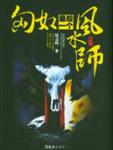Chapter 1 Chapter 1 Chile River, Under the Yin Mountain
Chilechuan, under the Yin Mountain.
The sky is like a dome, covering the whole field.
The sky is gray and wild,
When the wind blows the grass, the cattle and sheep are low.
According to legend, this folk song came from a mysterious ethnic group in ancient my country - the Huns.Historians are still lamenting about this nation, because it leaves too many mysteries. It can be said that knowing it is far less than not knowing it...
In the third century BC, that is, in the middle and late Warring States period, a group of people and horses suddenly appeared on the vast grassland in Mobei. No one can tell their origin, as if they fell from the sky overnight.Wearing animal skins and holding scimitars, they were like locusts overwhelming the sky. Wherever the cavalry went, people, livestock, and food were looted.Since then, the Xiongnu, a name that has changed people's reputation, began to appear in Chinese historical records.Since then, this black whirlwind has harassed the dynasties of the Central Plains for hundreds of years. During this period, how many famous anti-captive generals and how many tragic poems were born?
In A.D. 48, the early Eastern Han Dynasty, the Huns were divided into northern and southern parts due to civil strife. Later, the southern Huns surrendered to the Central Plains, while the northern Huns retreated to the foot of Yinshan Mountain.About fifty years later, the Han army launched a counterattack and wiped out Jinwei Mountain.
Regarding the ending of the northern Xiongnu, there are only a few short sentences in the history books - "In the third year of Yongyuan (that is, in 91 AD), the Han general Geng Kui sent his troops out of Jilusai, and joined the Xianbei (clan) to attack the Xiongnu at night. He led hundreds of remnant soldiers and fled to the west in a hasty manner, without knowing where to go..."
This hearty victory, while completely defeating the Huns, also left a mystery to history.The leader of the Northern Xiongnu——Bei Shanyu (the name has not been verified), just like his ancestors, disappeared overnight, and there is no record of him in the long history.
Modern historians have different speculations about the whereabouts of Bei Shanyu. One is that he fled to the Mongolian steppe. The Huns who swept across Europe two hundred years later and were called "God's Whip" by the West are his descendants.Another school of scholars believes that Bei Shanyu took refuge in Xianbei, and was absorbed and assimilated by Xianbei together with his people. The basis is a sentence in "Book of the Later Han Dynasty"-"There are still thousands of Northern Huns, all of whom call themselves Xianbei."
Ever since I was sensible, my father has repeatedly told me about the history of the Northern Huns. Only later did I find out that our ancestors had a grudge with Bei Danyu.The Han general Geng Kui who attacked the Xiongnu and drove Beidanyu to a dead end was the ancestor of our Geng family.
Some people may question that after two thousand years of reproduction and vicissitudes, it is not easy to confirm the root of one's own family, but who else can be identified?This is actually true, because since Geng Kui, his descendants have inherited a unique, terrifying and bizarre disease, and it has continued to modern times, even my father is not immune.According to the word of mouth of the Geng family's ancestors, all this is because of the war that year, when Geng Kui was put under the "Wolf Curse" by the Northern Huns shaman (wizard)...
Regarding the witchcraft of the Xiongnu shaman, there are few official histories or anecdotal records, and orthodox scholars don’t bother to study it, so not many people know it, let alone understand it, but from one example, we can still see It shows its viciousness—the famous Chinese general Huo Qubing defeated the Xiongnu repeatedly, and Shanyu hated him deeply, but he couldn't beat him on the battlefield, so he thought of witchcraft in desperation.During the Battle of Mobei, the Xiongnu shaman scattered the poison in the water source of the Han army. Huo Qubing was unfortunately recruited and died in pain after a few months of tossing. He was only 24 years old.
Tell me about my family history.Geng Kui was unable to join the army after he was hit by the "Wolf Curse", so he took off his armor and returned to his hometown in Shaanxi. Three years later, in the middle of the night, he suddenly jumped out of bed, climbed onto the roof, and knelt down in the rubble. He kept howling at the full moon until he died... This frightened the entire Geng family, but they didn't dare to say anything to the outside world, and lied that the sick man had covered up the matter.However, who would have thought that Geng Kui's bizarre death was just the beginning of the whole family's curse.
Since then, the descendants of the Geng family have contracted Guaibo. This disease is very similar to the rabies known in the modern medical circle, but it is not as fatal as rabies. Self-healing without treatment, repeatedly making life worse than death.I have personally witnessed the horrible situation when my father got sick—first he behaved abnormally, making wolf-like crawling movements, and then he became extremely sensitive, especially afraid of stimuli such as sound and light, and then began to lose consciousness Unclear, jumping up and down all over the room, gnawing on things... Finally, it was dark, and seeing him exhausted from tossing and tossing, he was huddled in a corner panting, but who knew that when the moon came out, he would come back again. Jumping on the window sill, salivating desperately at the full moon, it was like repeating the scene of Geng Kui before he died...

